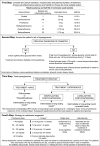Dexamethasone in the era of COVID-19: friend or foe? An essay on the effects of dexamethasone and the potential risks of its inadvertent use in patients with diabetes
- PMID: 32922517
- PMCID: PMC7476640
- DOI: 10.1186/s13098-020-00583-7
Dexamethasone in the era of COVID-19: friend or foe? An essay on the effects of dexamethasone and the potential risks of its inadvertent use in patients with diabetes
Abstract
Background: The disclosure in the media of a benefit with the use of dexamethasone in patients with COVID-19 infection sets precedents for self-medication and inappropriate use of corticosteroids.
Methods: This is a critical interpretive synthesis of the data available in the literature on the effects of the use of corticosteroids and the impact that their indiscriminate use may have on patients with diabetes. Reviews and observational and experimental studies published until June 18, 2020 were selected.
Results: Corticosteroids are substances derived from cholesterol metabolism that interfere with multiple aspects of glucose homeostasis. Interactions between corticoid receptors and target genes seem to be among the mechanisms responsible for the critical functions of glucocorticoids for survival and anti-inflammatory effects observed with these medications. Corticosteroids increase hepatic gluconeogenesis, reduce peripheral use of glucose and increase insulin levels. Previous studies have shown that glucocorticoids have a pro-adipogenic function, increasing deposition of abdominal fat, and lead to glucose intolerance and hypertriglyceridemia. In addition, these drugs play a role in controlling liver metabolism and can lead to the development of hepatic steatosis. Glucocorticoids reduce the recruitment of osteoblasts and increase the number of osteoclasts, which results in increased bone resorption and greater bone fragility. Moreover, these medications cause water and sodium retention and increase the response to circulating vasoconstrictors, which results in increased blood pressure levels. Chronic or high-dose use of corticosteroids can, by itself, lead to the onset of diabetes. For those who were already diagnosed with diabetes, studies show that chronic use of corticosteroids leads to a 94% higher risk of hospitalization due to diabetes complications. In addition to the direct effects on glycemic control, the effects on arterial pressure control, lipids and bone metabolism also have a potential for severe consequences in patients with diabetes.
Conclusion: Fear and uncertainty toward a potentially serious infection may lead people to self-medication and the inappropriate and abusive use of corticosteroids. More than ever, it is necessary for health professionals to be alert and able to predict damages related to the use of these drugs, which is the first step to minimize the potential damages to come.
Keywords: COVID-19 pandemic; Corticosteroids; Dexamethasone; Diabetes mellitus; Metabolic effects.
© The Author(s) 2020.
Conflict of interest statement
Competing interestsNo potential conflicts of interest relevant to this article were reported.
Figures
References
-
- Oliva G. Coronavírus: desaparecimento da cloroquina das farmácias do Rio preocupa pacientes usuários de medicamentos. O Globo, Rio de Janeiro, 21 de março de 2020. Sociedade. https://oglobo.globo.com/sociedade/coronavirus-servico/coronavirus-desap.... Acessed 20 2020.
-
- Verdélio A. Brasil recebe 2 milhões de doses de hidroxicloroquina dos EUA. Agência Brasil, Brasília, 01 de junho de 2020. https://agenciabrasil.ebc.com.br/politica/noticia/2020-06/brasil-recebe-.... Acessed 20 2020.
Publication types
LinkOut - more resources
Full Text Sources



